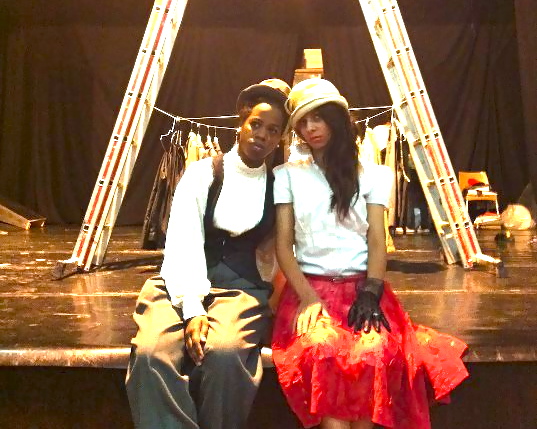

Palestinian identity unfolds on two stages

As the West Bank Palestinian leadership was preparing for its September statehood bid at the United Nations General Assembly, 20-year-old Mariam Abu Khaled was getting ready for a different drama.
In Jenin refugee camp, one of the most isolated and disadvantaged regions in the West Bank, Mariam and four other young actors were preparing for the opening night of “Waiting for Godot”, their graduation project from the Freedom Theatre Acting School.
“On stage, I can do whatever I want,” says Mariam, who came of age in the decade following the second Palestinian Intifada against Israeli occupation. The uprising brought widespread violence, restrictions on movement and growing frustration and despair, especially among youth. Not only was the fabric of Palestinian cultural life shattered, but Palestinian society, always skeptical about girls’ involvement in theatre, had become increasingly conservative.
“Everyone tried to convince me that theatre is not for women,” says Mariam’s fellow actor Batool Taleb, 20, whose family at first forbade her from going to the theatre or even entering the refugee camp, so that she had to sneak off to rehearsals. “My dream since childhood was to be a successful actress… so when I heard that the first Acting School in Palestine was opening in Jenin I had no doubts about joining.”
Started in 2006, the Freedom Theatre’s mission is to give young Palestinians living under the constraints of occupation a creative outlet to explore their emotions, and a way to use culture and the arts “to develop the skills, self-knowledge and confidence which can empower them to challenge present realities and to take control of their futures.”
Rabe’a Turkman, an Acting School student from the nearby town of Qabatiya, says he sees theatre as a powerful form of resistance. “I was a fighter during the Second Intifada and was wanted by the Israelis. When the intifada ended I signed an amnesty agreement and joined the Acting School in order to continue spreading my message of resistance through arts and culture.”
In addition to the Acting School, the Freedom Theatre offers a wide range of artistic and cultural activities for children, youth and young adults, including drama, photography and film performances and classes.
The recent production of “Waiting for Godot”, an allegory about the search for friendship, solidarity and meaning, was chosen to help students cope with the murder last spring of the theatre’s beloved founder and artistic director, Juliano Mer Khamis.
The play is being produced with support from the MDG Achievement Fund, as part of its programme to build up the economy of the Occupied Palestinian Territory through cultural development and women’s empowerment.
Mariam says the MDG-F grant helped give the theatre hope in the vacuum after Mer Khamis’ death, and allowed the troupe to move temporarily to a more secure rehearsal space. “A lot of people contacted us after the murder of [Juliano], telling us ‘you’ have to be strong, ‘you’ have to continue, but the United Nations said ‘we’ and helped us to continue the dream.”
For Miriam and Batool, whose class is the first to graduate from the theatre’s three-year programme, the stage has given them the platform to try new things, to be seen, and -- most importantly -- to be heard.
“Art has the power to make girls feel better inside,” says Miriam. She says it encourages her to take risks and to challenge the status quo that perpetuates the Palestinians’ political stalemate and that limits women’s rights and equality.
Her friend Batool agrees: “Today I have two struggles; to free myself as a Palestinian from Israeli occupation and to free myself as a woman in my society.”
*******************************************************************************************************************
The UN Joint Programme for Culture and Development in the Occupied Palestinian Territory encourages the development of cultural activities as a way to increase livelihoods and social cohesion. In this way, it aims to help achieve the Millennium Development Goals of reducing poverty, empowering women and increasing gender equality and environmental sustainability.
The Joint Programme is a collaboration between four UN agencies (UNESCO, UN Women, UNDP and FAO) and Palestinian governmental institutions, local authorities, community-based organizations and civil society.